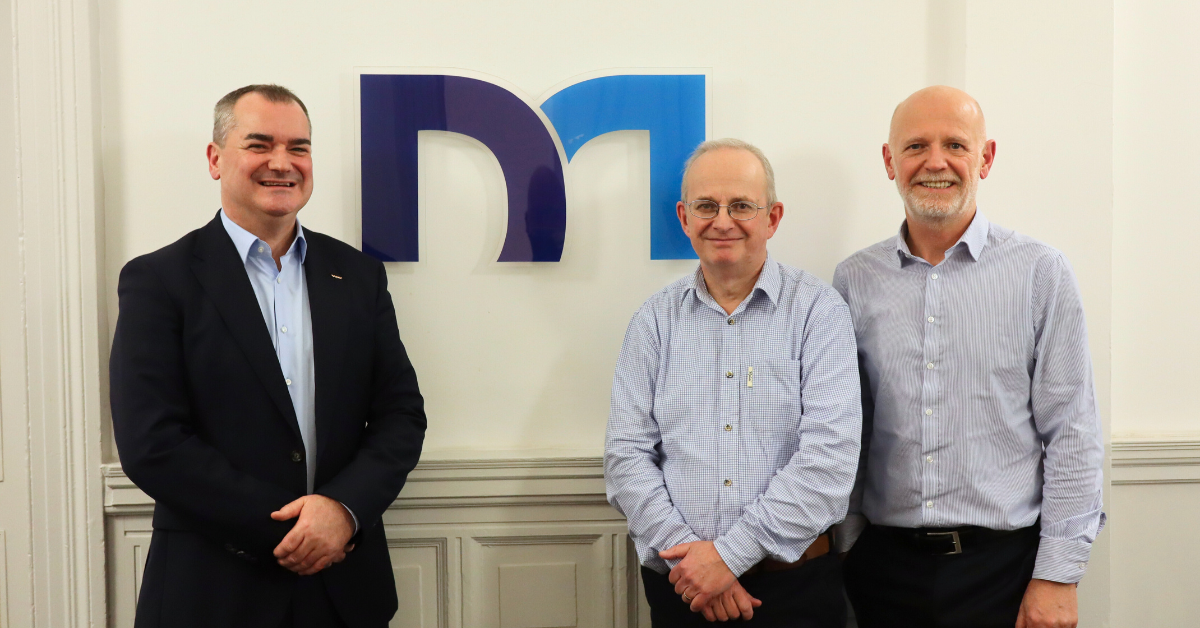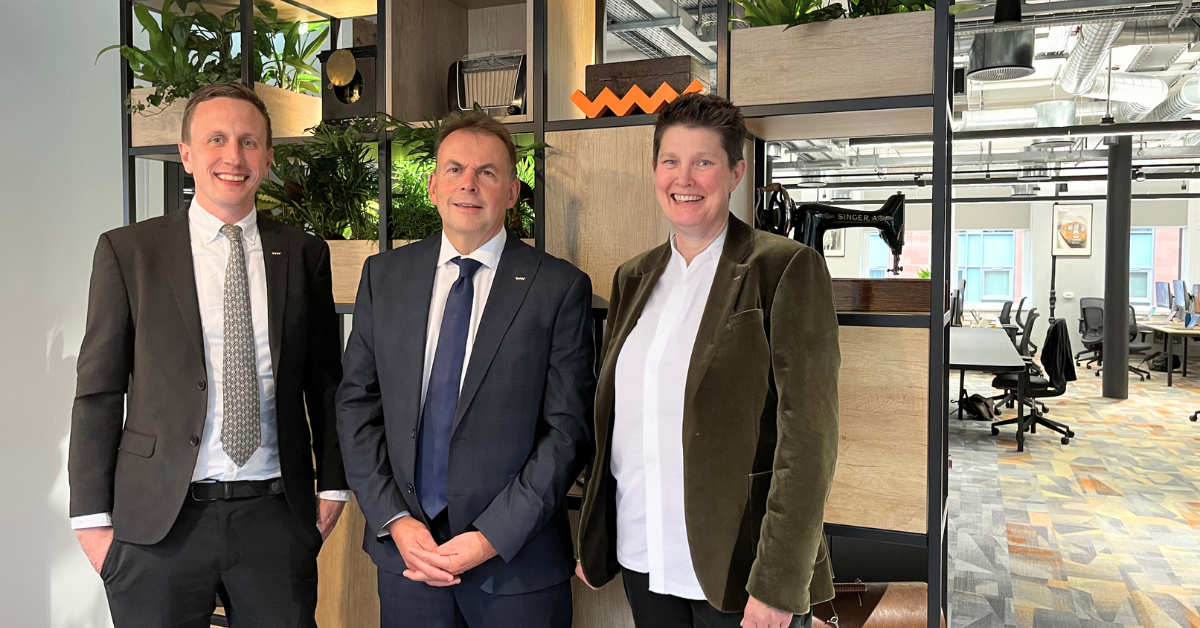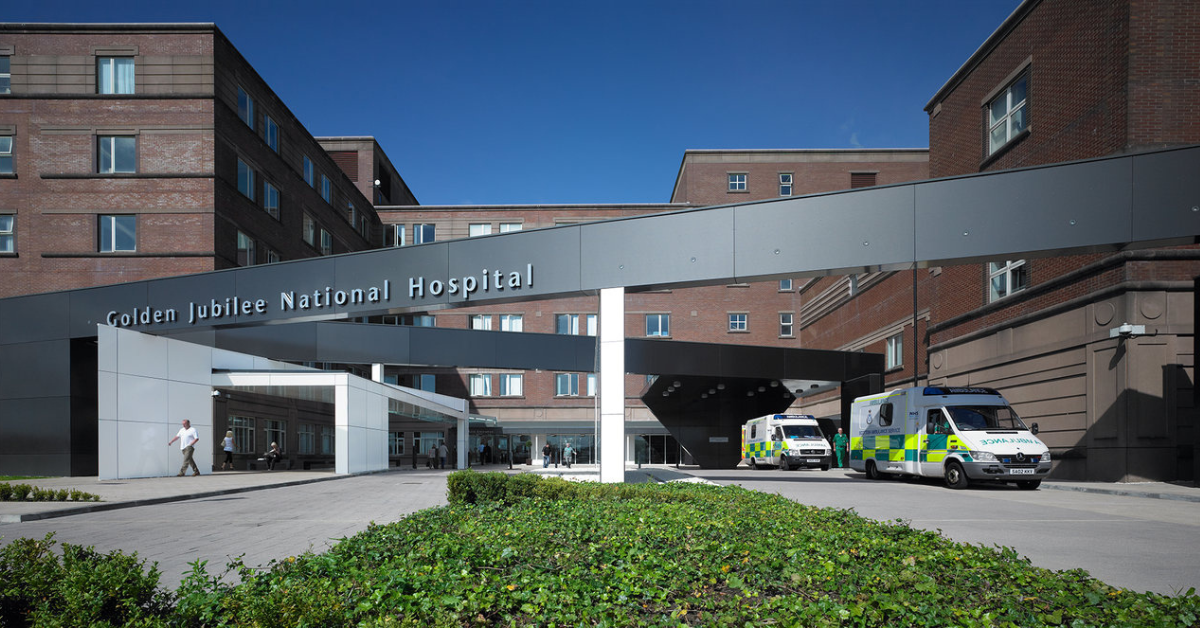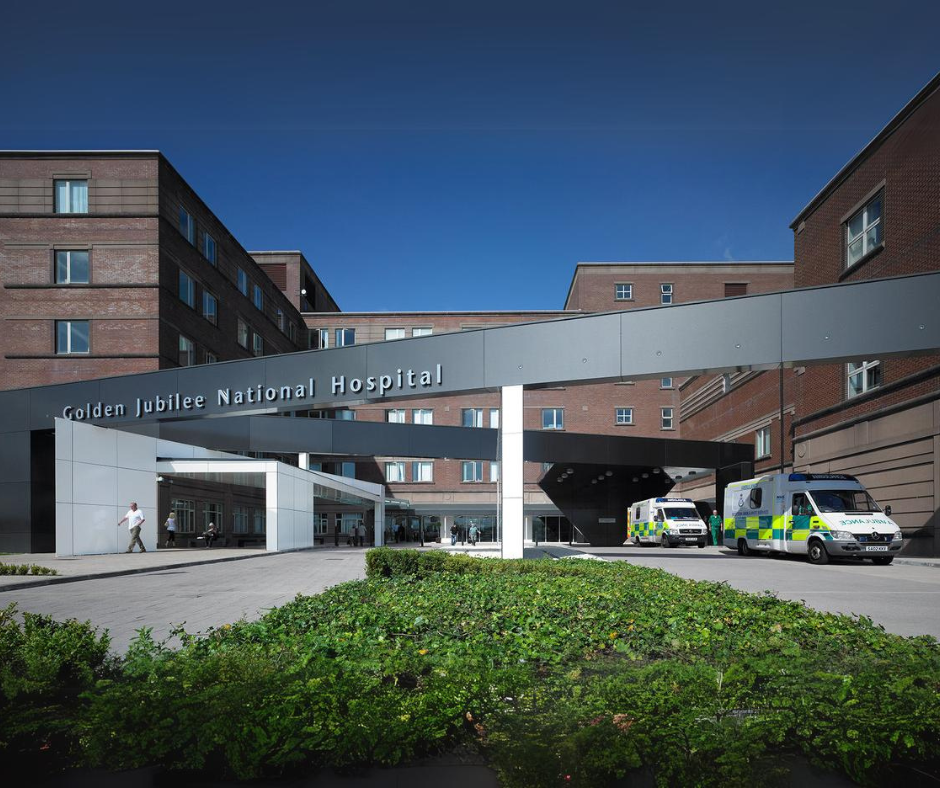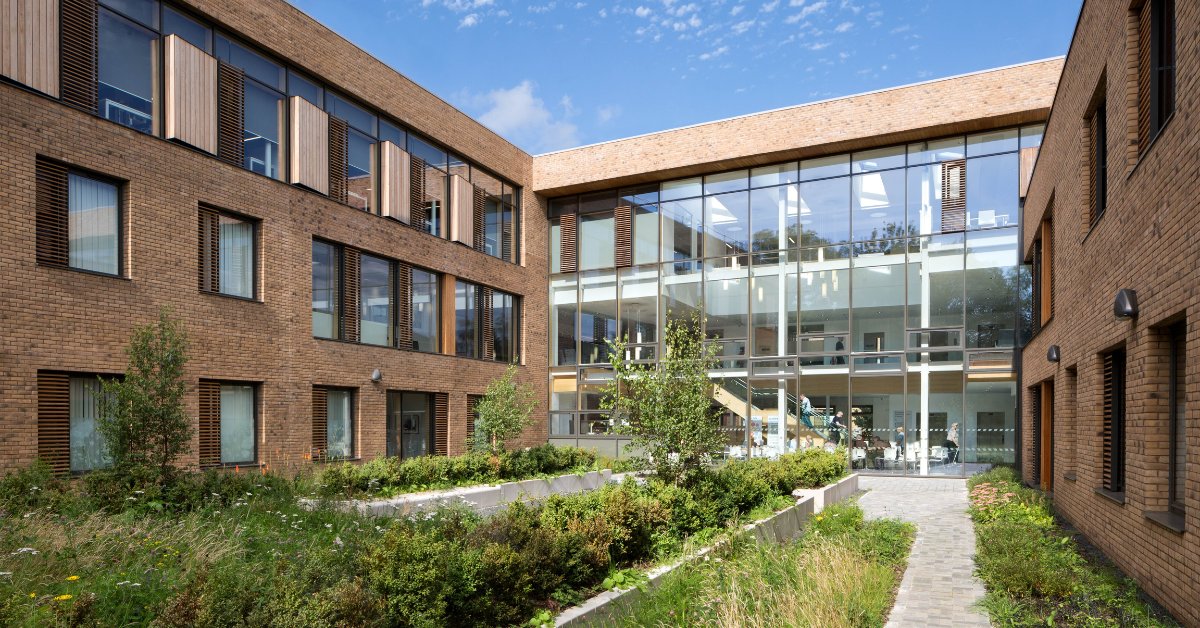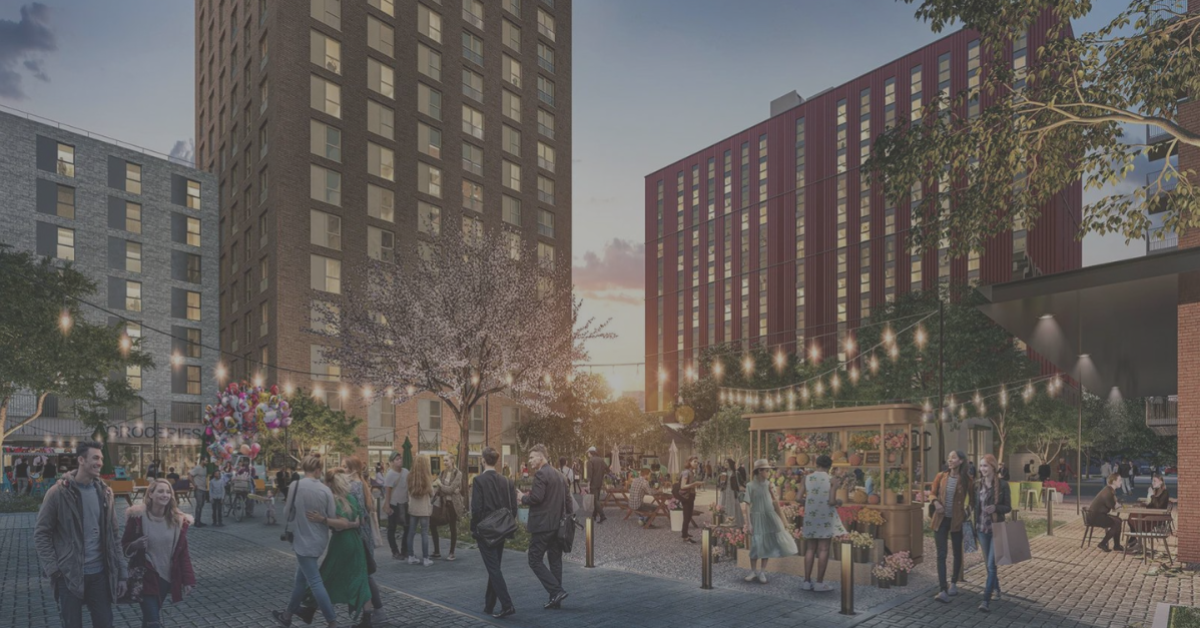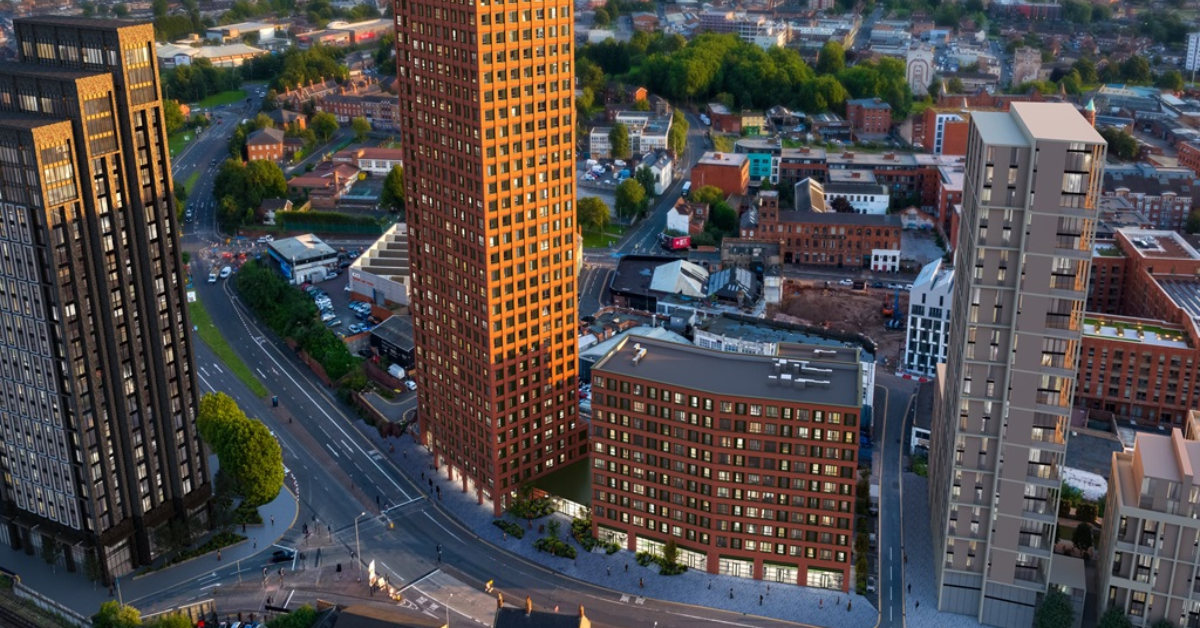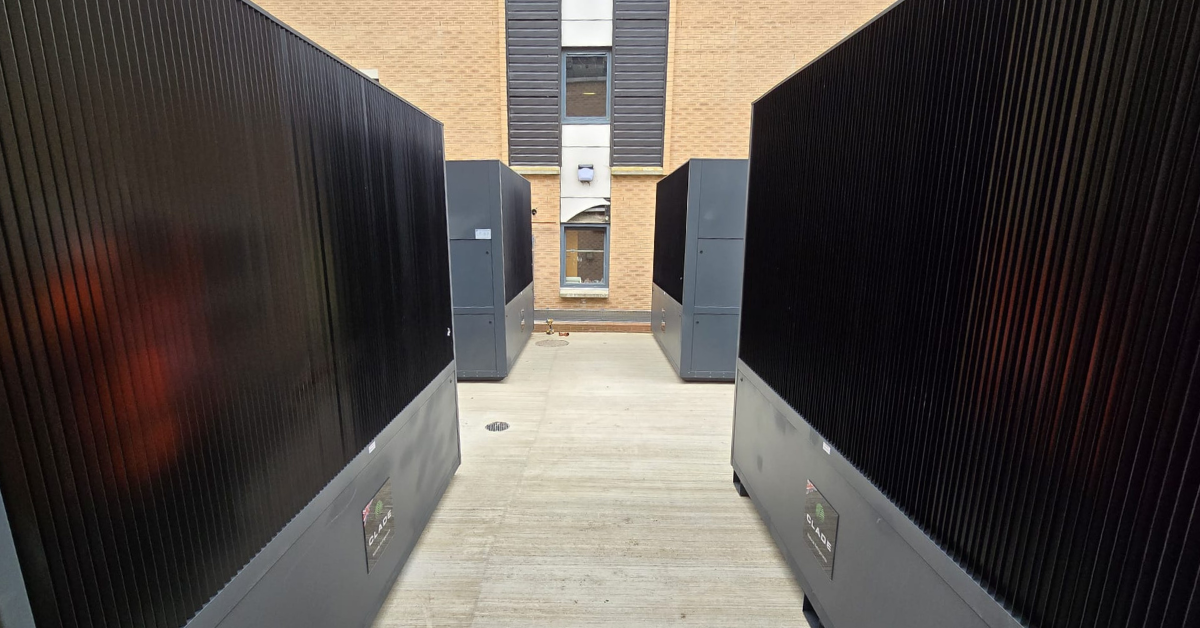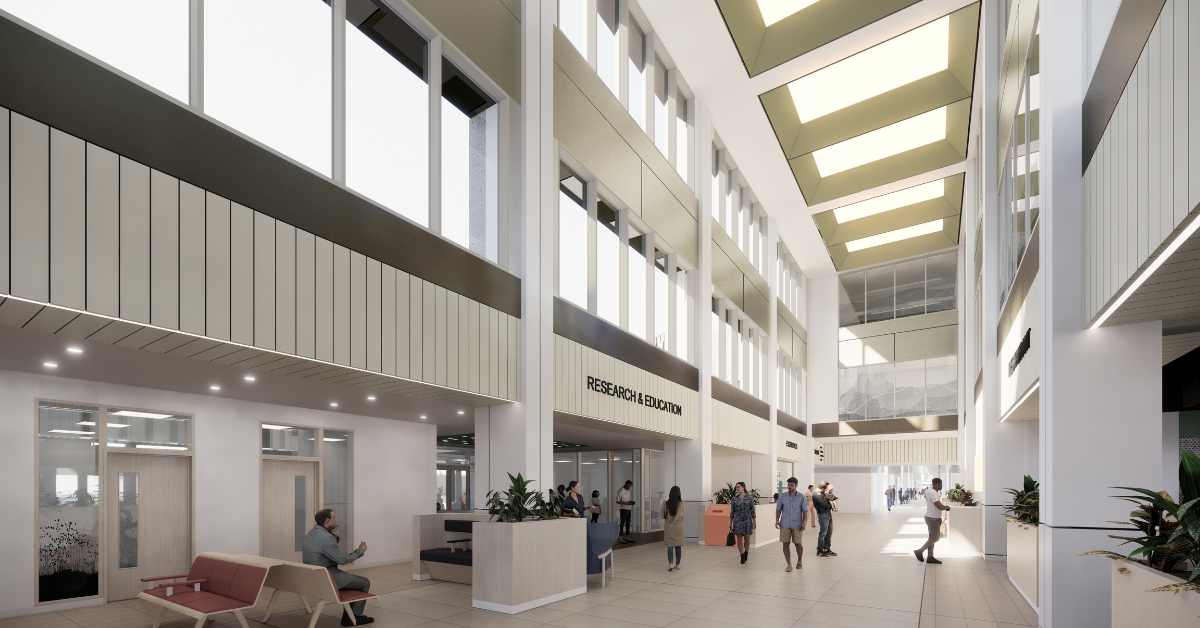Wallace Whittle Invited to Join Scale Up 2.0 Initiative with The Hunter Foundation
News
Wallace Whittle Invited to Join Scale Up 2.0 Initiative with The Hunter Foundation
Wallace Whittle Invited to Join Scale Up 2.0 Initiative with The Hunter Foundation

Wallace Whittle has been invited to participate in the prestigious Scale Up 2.0 initiative, led by The Hunter Foundation.
This exclusive program is designed to support high-growth businesses headquartered in Scotland, providing them with the tools, mentorship, and strategic guidance to scale effectively to £100m+ in revenues.
Our selection for Scale Up 2.0 is a testament to Wallace Whittle’s strong position as an ambitious, scalable business with high profitability and a relentless growth mindset. We take great pride in this recognition, which reinforces our commitment to sustainable expansion and industry leadership.
A Year of Learning and Growth
Over the next year, our Managing Director, Allan McGill, will be actively participating in the program’s leadership retreats, gaining invaluable insights and strategies to propel our business forward. Additionally, members of our wider Board team will engage in select sessions, ensuring that the benefits of this initiative are embedded across our organisation.
“With us now in our fourth year of business since our MBO, and organically growing from £8m to £15m, this invite has come at just the right time as we look to scale up over the next few years. We’ve already started off well with the recent acquisition of Davie + McCulloch and more opportunities currently being considered.
Being part of this programme will allow us access to many talented individuals with experience of scaling up businesses across various sectors. One of the first sessions was given by Sir Tom Hunter himself – it was fascinating and inspiring to hear first-hand how he scaled up his business and the rules he worked to when doing it.” Allan shared.
Our Goals
This opportunity will also provide us with a unique platform to refine our vision, accelerate innovation, and strengthen our market position, which the full board are fully engaged with as we look to grow and scale the business.
We look forward to sharing our journey with you and working with the other programme participants, as we leverage this opportunity to drive Wallace Whittle to new heights.
For more information on Scale Up 2.0, visit Scale Up Scotland.
Wallace Whittle Are Good Business Charter Accredited
News
Wallace Whittle are Good Business Charter Accredited
Wallace Whittle are Good Business Charter Accredited
WWe are officially accredited by the Good Business Charter! This accreditation is a testament to our commitment to responsible business practices and aligns with our Environmental, Social, and Governance (ESG) principles.
At Wallace Whittle, we are committed to responsible business practices and integrating Environmental, Social, and Governance (ESG) principles into everything we do. That’s why we are proud to announce our accreditation with the Good Business Charter (GBC), a network of over 1,000 businesses that share a commitment to ethical and sustainable practices. To earn this accreditation, we adhered to all 10 GBC components, which encompass a broad spectrum of responsibilities towards employees, suppliers, customers and the environment.

We recognised the value of the Good Business Charter’s 10 components, which set clear expectations for responsible business behavior. These principles align closely with our own ESG commitments, making it a natural fit for us. As an ESG service provider, we believe in practicing what we preach, and joining the GBC provides a recognised commitment to these values as we embark on our own PathWWay for Wallace Whittle.
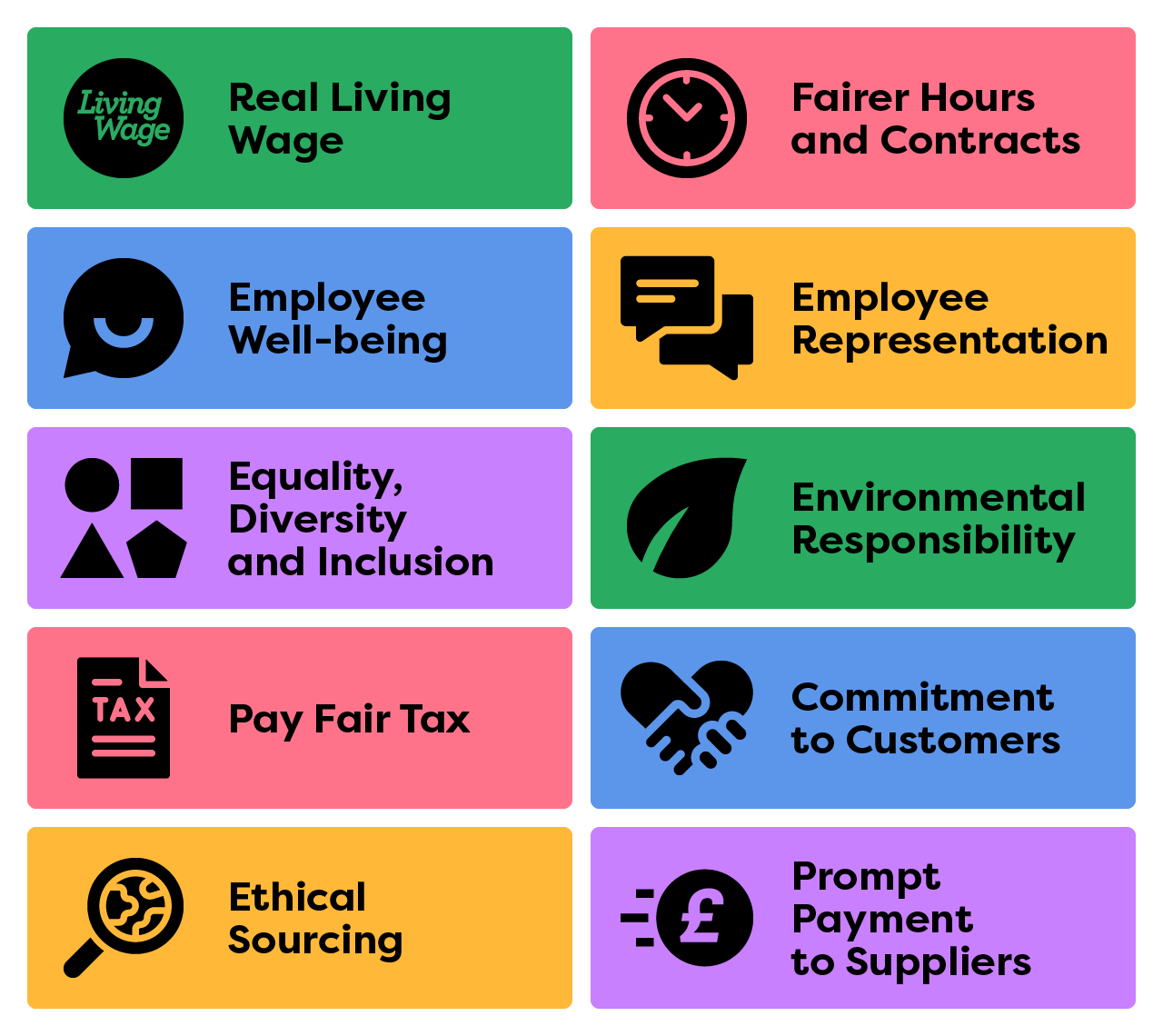
Our Business, Our People, Our Impact
Being accredited by the GBC offers third-party validation of our responsible business practices, reinforcing that we are not only providing ESG services but also embedding these principles into our company culture. Several GBC components focus on employee well-being, including:
- Employee representation
- Equity, Diversity & Inclusion (E,D&I)
- The Real Living Wage
- Fairer hours and contracts
These components align with our commitment to developing and supporting our people as we continue to grow our investment in their well-being.
ESG & GBC
Our GBC membership supports our internal ESG Strategy by providing a recognisable accreditation that affirms our commitment to responsible business practices. Furthermore, the GBC’s 10 components align seamlessly with client needs within our PathWWay model, enhancing our ability to communicate and implement ESG strategies effectively.
PathWWay is our bespoke approach which enables organisations to highlight their ESG and Sustainability ambitions across a range of issues, including governance, energy and environmental, and incorporating broader aspects such as social value and ecological impact. The approach considers issues that are material to all stakeholders and can reflect, for example organisational targets, funding and planning requirements and social value commitments.
“We are delighted that Wallace Whittle is now accredited with the Good Business Charter. The GBC and its 10 components reflect our commitment to being a responsible business and will be integral to our ESG strategy. This recognition supports our business, our customers, and our people in creating a more ethical and sustainable future.”
Nick Hayes, Director of ESG & Sustainability – Wallace Whittle

Our ESG team recently attended the GBC 5th Anniversary event in London, where Deputy Prime Minister Angela Rayner delivered the keynote speech, reaffirming her commitment to the biggest upgrade to workers’ rights in a generation through the Employment Rights Bill – and its clear mission to boost growth and living standards across the UK.
With 97% of people valuing responsible business, GBC’s independent certification sets us apart as a leader in ethical capitalism.
We look forward to leveraging this accreditation to further strengthen our ESG efforts and continue making a meaningful impact for our people, our clients and the wider community.
If you’re looking to discuss all things ESG & Sustainability, or want to find out more about how we got accredited, reach out to Nick Hayes, Director of ESG & Sustainability at [email protected]
Project Milestone Achieved with Phase 2 Handover at Golden Jubilee Hospital
News
Project Milestone Achieved with Phase 2 Handover at Golden Jubilee Hospital
Phase 2 Handover at The Golden Jubilee Hospital
The Golden Jubilee Hospital in Clydebank reached a significant milestone recently with the official handover of Phase 2, marking the completion of the Surgical Centre. This development builds on the success of Phase 1, which saw the completion of the state-of-the-art Eye Centre in 2020.
Phase 1 of the Golden Jubilee introduced a purpose-built Eye Centre equipped with six theatres and integrated outpatient and diagnostic facilities. This phase has already set a high standard of care, particularly for patients requiring cataract surgery, and served as a strong foundation for the continued expansion of the hospital.
The completion of Phase 2, further enhances the Golden Jubilee Hospital’s capabilities with a range of new facilities, designed to meet the growing demand for elective care in Scotland. The new Surgical Centre includes:
- Additional general surgery, orthopaedic and endoscopy facilities
- New surgical admissions and recovery unit
- New Central Sterile Processing Department
- New Day Case / Day Surgery admission unit
Wallace Whittle were involved throughout both stages, consulting on the MEP and sustainability design.
“We were delighted to be the MEP and Sustainability designers for the new Surgical Centre delivered as part of the National Treatment Centre programme at the Golden Jubilee University National Hospital.
Having already successfully delivered the Eye Centre on the same site, we were keen to further enhance the Golden Jubilee Foundations ability to provide additional day case treatment to patients in Scotland.
Working successfully with the design and client teams, we have delivered another successful healthcare project for Scotland.” Paul Cooper, Healthcare Lead Scotland & Northern Ireland
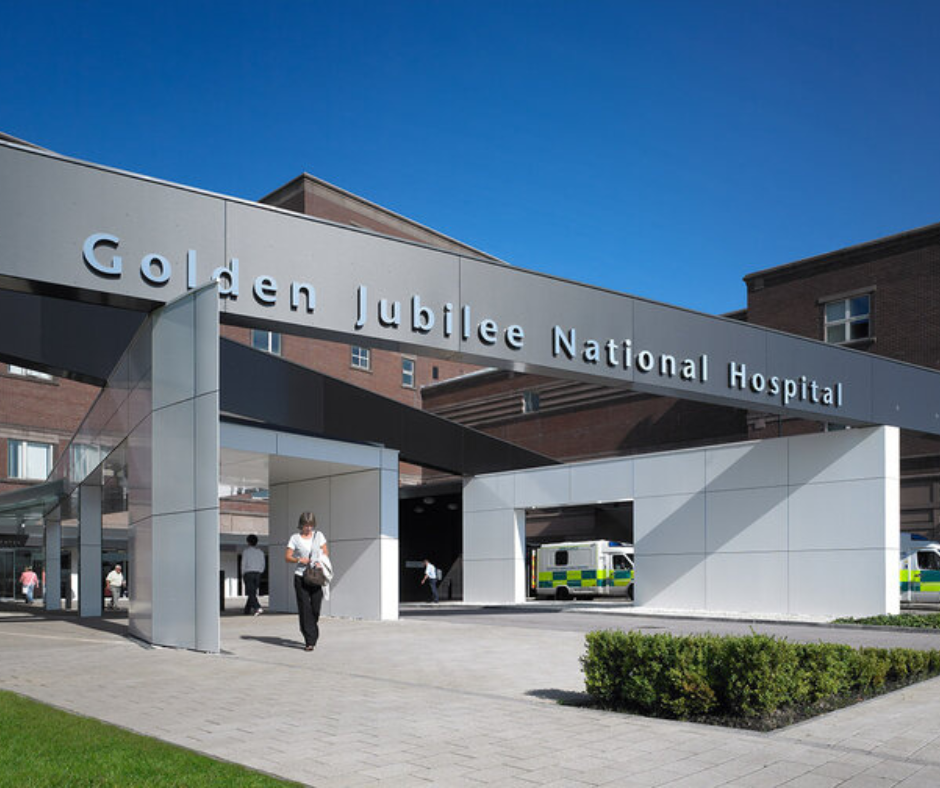
With the completion of Phase 2, the Golden Jubilee Hospital is well-equipped to meet the needs of patients in Scotland, offering modern facilities and enhanced care.
This milestone also marks a significant achievement in the ongoing development of the hospital.
To learn more about our healthcare initiatives and the ongoing projects visit our Healthcare Expertise page or reach out directly to our dedicated healthcare leads, Paul Cooper for Scotland and Northern Ireland, and Jon Blackhurst for England.
Wallace Whittle Delivers M&E & Sustainability Design for Landmark Dyecoats Development in Leeds
News
Wallace Whittle Delivers M&E & Sustainability Design for Landmark Dyecoats Development in Leeds
Wallace Whittle Delivers M&E Engineering & Sustainability Design Services for the signature Dyecoats Development in Leeds, one of the first new high-rise projects to receive Building Safety Act Gateway 2 approval.
The Dyecoats development is a transformative new riverside neighbourhood near Leeds City Centre. We were engaged by Latimer by Clarion Housing Group to deliver Mechanical, Electrical & Sustainability engineering design from early concept stages through to construction, whilst ensuring the project complies with Leeds Local Planning Policies and Clarion’s commitment to sustainability.
The landmark project has successfully secured Building Safety Act Gateway 2 approval for three new buildings which form part of a wider regeneration project on Kirkstall Road in Leeds. This significant milestone as one of the first high-rise new builds to achieve this status is testament to the collaborative expertise and diligence of the entire team, to follow due process and demonstrate compliance.
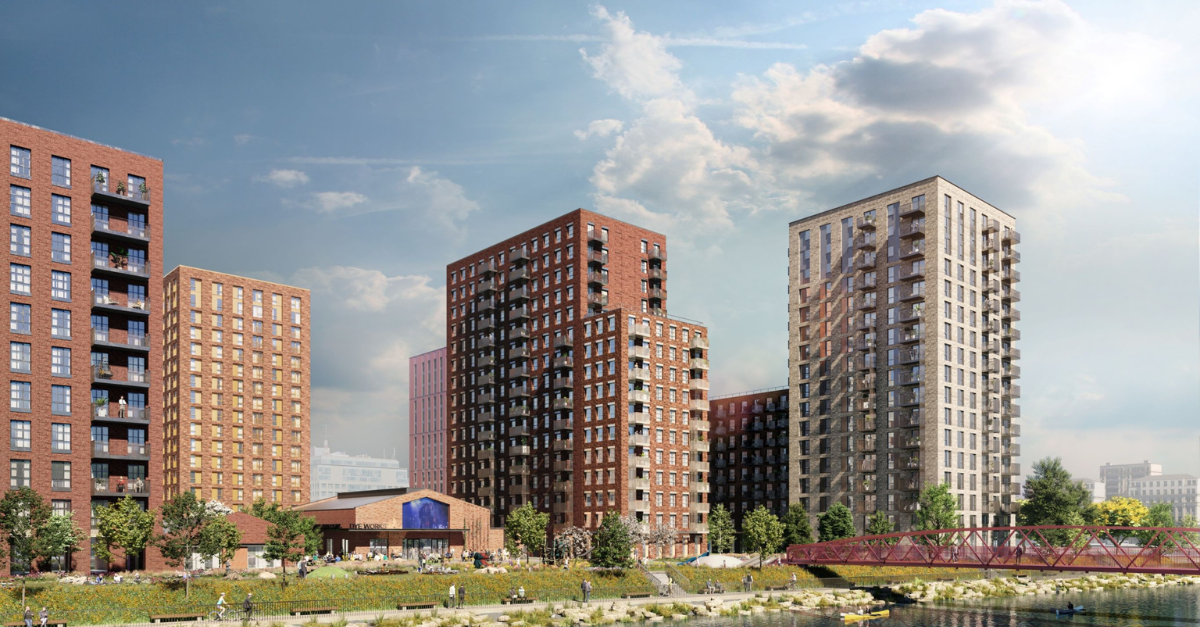
Dyecoats is a 13-acre mixed-use development that will deliver:
- Over 1,800 new homes, including affordable, rental, and market-sale properties
- High Quality public realm and green spaces
- Flexible community and commercial spaces
- New bridge over the River Aire
- Towers and medium-rise blocks with Wellbeing and Safety as core values
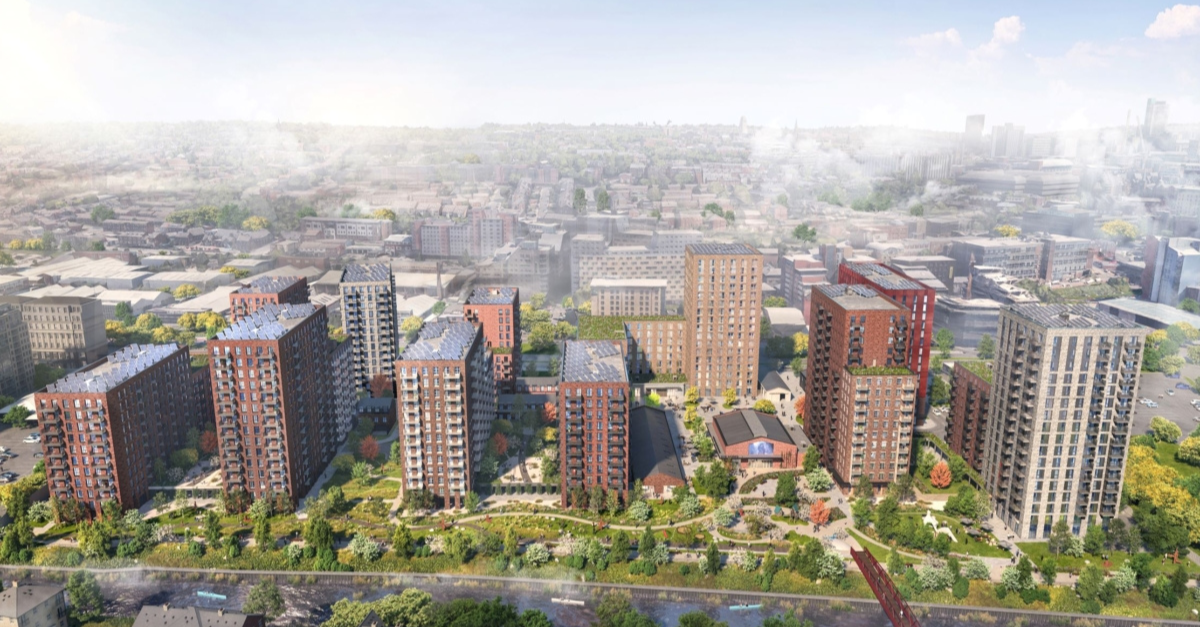
Wallace Whittle has set an MEP and Energy strategy to achieve the anticipated Future Homes Standard as part of Clarion Housing Group’s Roadmap to Net Zero Carbon. This ensures the development meets rigorous sustainability and energy efficiency goals, making it one of the first projects to align with Clarion’s Net Zero strategy.
By adopting a fabric first approach to energy and accompanying this with net zero technologies, including Air Source Heat Pumps & PVs, we are delivering mechanical and electrical engineering solutions that prioritise:
- Energy-efficient all electric design in line with net-zero targets
- Sustainable building systems including Heat Pumps that reduce environmental impact
- Innovative engineering solutions for a resilient and future-proof community
- Overheating mitigation compliance
- Apartments designed for resident wellbeing, whilst adaptable to future expectations.
- Optimised Infrastructure and enlivened public realm
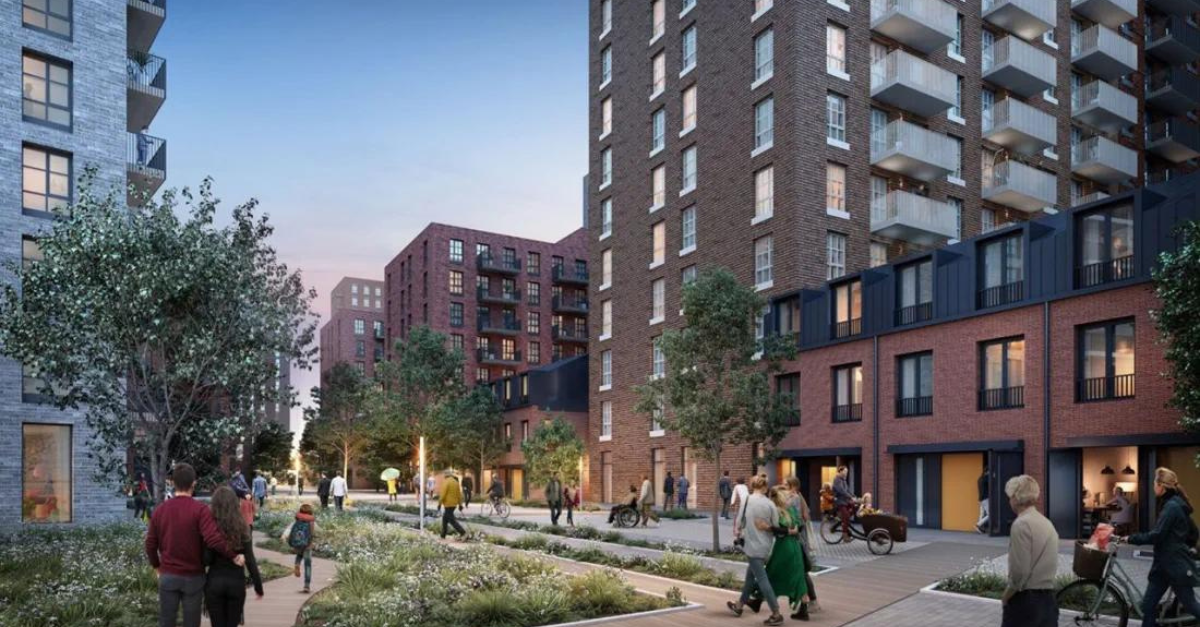
“We are proud of our association with Latimer by Clarion Housing Group and glad to have been on the journey with them to help deliver these much-sought after, new high-quality homes in what will become Leeds amazing new neighbourhood.
The MEP Engineering Services and Energy Performance throughout has been carefully integrated within the development to deliver optimised value for the client, residents and community stakeholders.”
With our expertise, we are ensuring that Dyecoats is a benchmark project for sustainable urban regeneration in Leeds.
Get in touch with us today to discuss your next project or to learn more about our ESG, Residential & Living Sector experience across the UK, email Craig – Craig Robertson – Director, England & Head of Residential
Natural Refrigerant Heat Pumps: A Sustainable Solution
News
Natural Refrigerant Heat Pumps: A Sustainable Solution
Natural Refrigerant Heat Pumps: A Sustainable Solution
As the world continues to grapple with the challenges associated with climate change, the need for sustainable, energy-efficient solutions has never been greater.
Modern heating technologies relying on F-gases like HFCs may help towards more energy efficient solutions, but they contribute significantly to global warming due to their high Global Warming Potential (GWP). This is why we are seeing a gradual shift to natural refrigerant heat pumps, a proven environmentally friendly alternative that combines high performance with a drastically reduced carbon footprint.

The Environmental Case for Natural Refrigerants
Natural refrigerants refer to those which are naturally occurring, such as propane, ammonia or carbon dioxide, and when it comes to combating climate change, the environmental cost of refrigerants cannot be underestimated. F-gases, such as HFCs, are widely used in traditional heating and cooling systems but have alarmingly high GWP, when those gases are released into the atmosphere, they trap significantly more heat than Carbon dioxide, which leads to the acceleration and worsening of global warming.
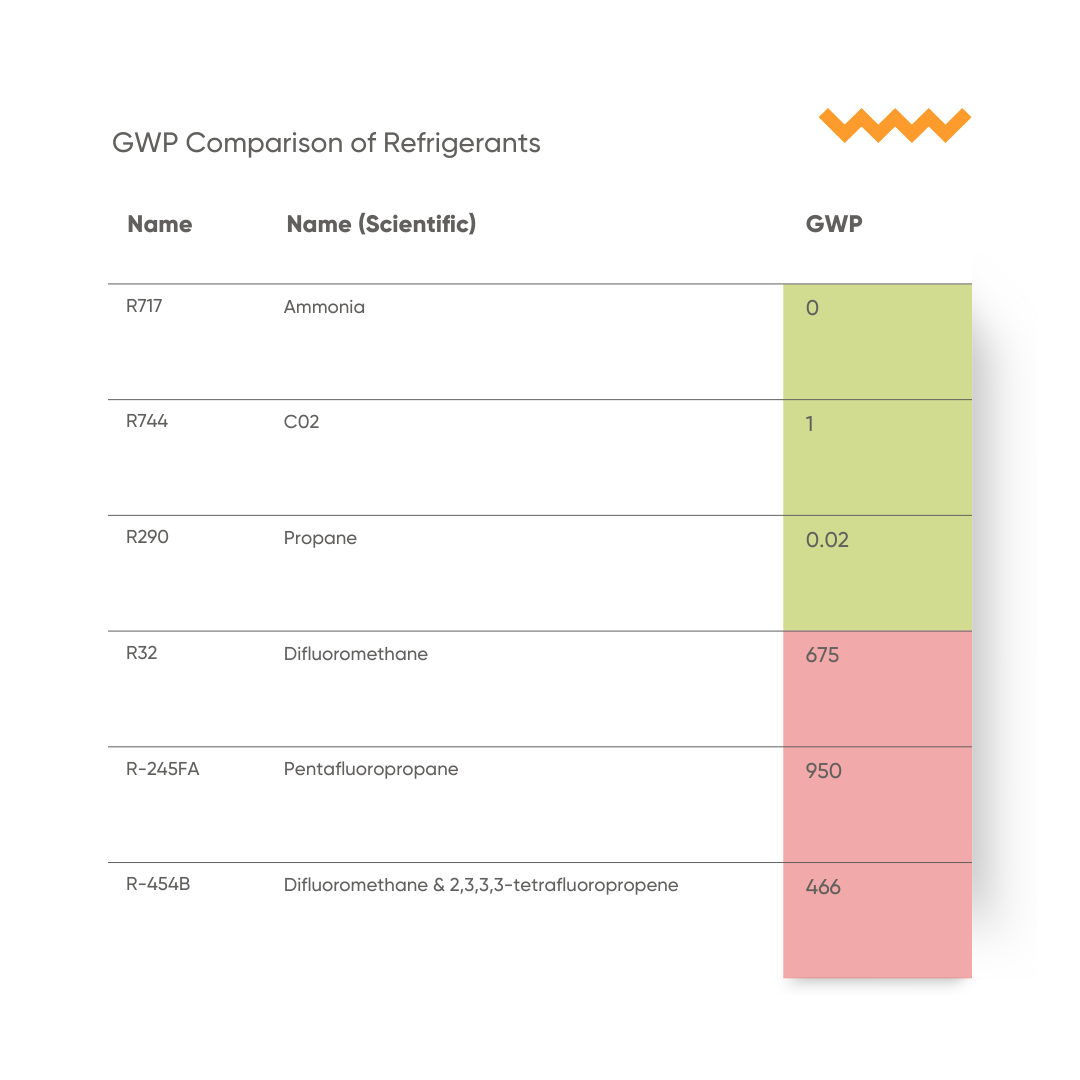
Natural refrigerants, in contrast, have a much lower GWP. This stark difference makes natural refrigerants an obvious choice for environmentally conscious projects, especially with the increasing regulations aiming to minimise high-GWP refrigerants.
Large F-gas systems are also known for leaking 5–10% of their refrigerant into the atmosphere annually. These leaks, categorised as ‘fugitive emissions’, significantly increase the carbon footprint of a building and must be reported under PAS2050 carbon reporting; by making the use of low-GWP refrigerants it’s also an effective way to reduce reported emissions.
By adopting natural refrigerants such as R744, R290, or R717, building systems can drastically reduce their environmental impact, aligning with carbon reduction targets and creating a more sustainable future.
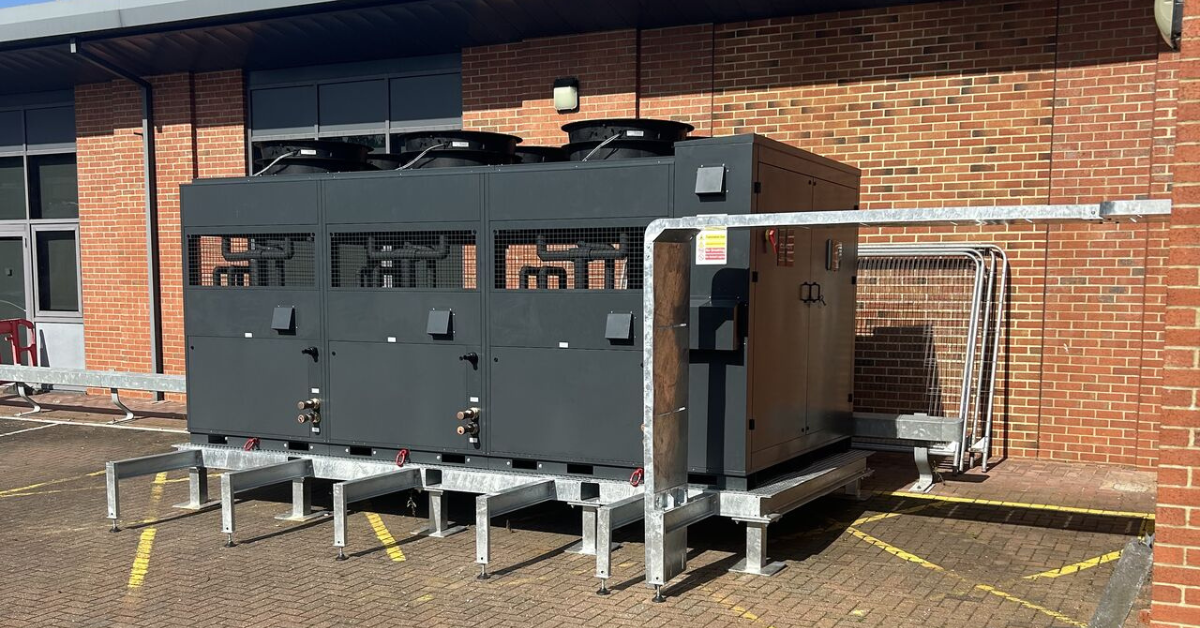
Key Benefits of Natural Refrigerants
Natural refrigerant heat pumps have an array of benefits that make them an increasingly popular choice for both new builds and retrofit projects. Their superior operational performance, compatibility with existing systems, and alignment with future environmental regulations set them apart from traditional F-gas systems, whilst being significantly better for the environment. Major benefits of natural refrigerants include:
- High Efficiency at High Temperatures – Natural refrigerants like R744 (CO₂) and R290 (propane) can deliver LTHW at 65–80°C with excellent SCOPs. Unlike some common systems being specified today in UK building services which rely on HFC’s, heat pumps using natural refrigerants often don’t require additional in-line equipment to boost temperatures for DHW, cutting capex and operational costs!
- Cost-Effective Retrofits – For refurbishment projects, R290 systems often work with existing radiators and pipework, due to their ability to operate at a more traditional system ΔT, matching those of gas boiler led systems minimising upgrades and reducing installation costs. Reusing infrastructure also lowers the whole-life carbon impact of the project.
- Reduced System Costs – While some systems (for example R744) may have higher capex costs for the heat pumps themselves compared to their competitors, savings from smaller-diameter pipes and simpler installations make natural refrigerants more cost-effective over the system’s lifespan. This is due to the wider system ΔT that is required (around 40°C) which reduces the mass flowrate of the systems, thus reducing pipe sizes, valve sizes, simplifying installation and reducing the embodied carbon of the MEP package.
- Future Proofing and Compliance – Natural refrigerants meet tightening regulations like the UK’s 79% F-gas reduction by 2030. They ensure long-term compliance, reduce reliance on HFCs, and enhance sustainability credentials, supporting net-zero goals.
There is also a significant push from consumers and industries for more sustainable alternatives. Natural refrigerants align with the needs of conscious companies, stakeholders and consumers striving to reduce their carbon footprint.
For businesses, adopting a low-GWP refrigerant system can increase the marketability of assets. Buildings with sustainable heating systems are more attractive to potential renters and buyers who prioritise green initiatives, making them valuable in competitive markets. This trend also reflects growing consumer and corporate demand for solutions that align with modern ESG targets and climate-driven goals.

Looking Ahead
As industry continues to evolve, natural refrigerants are emerging as the leading alternative to F-gases. Manufacturers are increasingly developing next-generation heat pumps which utilise natural refrigerants. By using these systems now, businesses can stay ahead of production trends and position themselves as leaders in sustainable innovation.
Additionally, there are tightening regulations which are accelerating the shift away from F-gases. Following Brexit, the UK adopted and rebranded the EU’s F-Gas regulations to DEFRA F-Gas regulations which mandate a 79% reduction in F-Gases by 2030. The UK is also committed to reducing HFCs by 80% by 2047 under the international treaty, the Montreal Protocol. Additionally, the Green Heat Network Fund offers financial incentives to projects using low-GWP refrigerants. These measures collectively push for a lower-GWP future.
Although natural refrigerants are not a new discovery, their application in heat pumps has only gained momentum in recent years. Industries like retail and logistics have long relied on ammonia, propane, and CO₂ in large-scale refrigeration systems. Think of shops like ASDA and Tesco, where these refrigerants have been safely used for decades. The challenge, however, lies in applying this technology to domestic and commercial heat pumps.
Natural refrigerants present some manageable challenges, each of which can be addressed with proper safety measures and protocols. Propane (R290) is flammable but is used in minimal quantities, comparable to the amount of propane found in a typical barbecue. BS EN 378 helps us navigate these challenges with ease. CO₂ (R744) operates at high pressures, which can increase manufacturing costs; however, its efficiency offsets these costs by reducing the capex required for pipes, valves, and installation, as well as opex. Ammonia (R717) is toxic at high concentrations, but it is safe when stored and managed correctly with appropriate controls. These risks are well understood and can be effectively mitigated through proper management protocols, robust safety measures, and training.
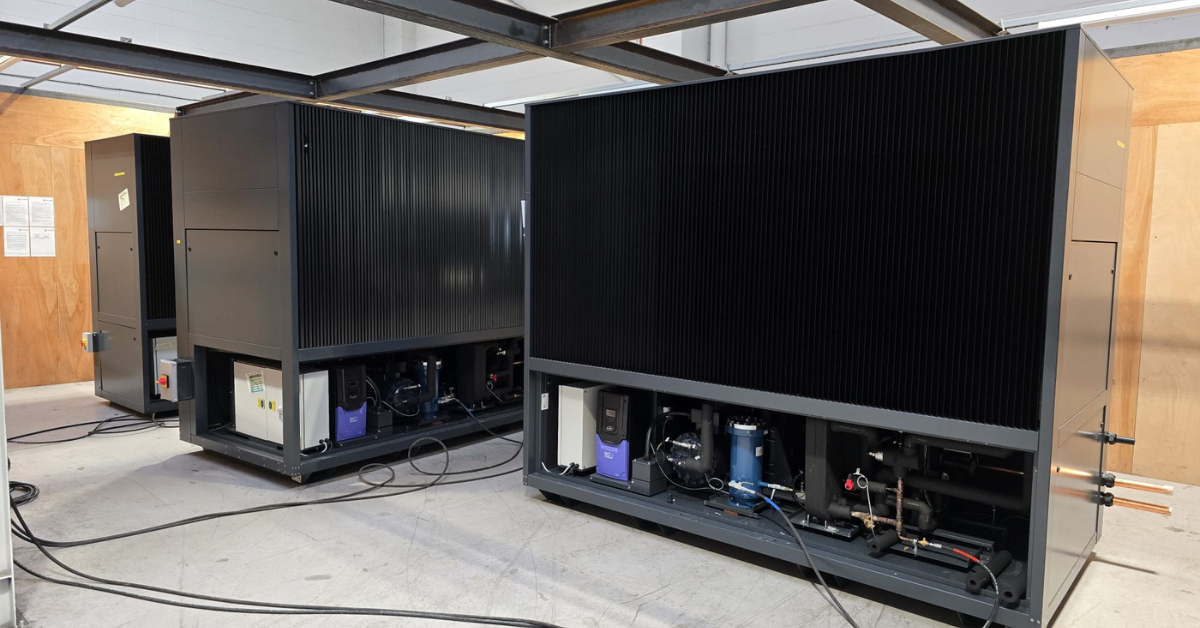
With increasing regulatory pressure, evolving manufacturer offerings, and consumer demand for sustainable solutions, natural refrigerants represent a critical investment for the future. By adopting these technologies early, businesses can reduce environmental impact, stay compliant, and deliver systems that align with net-zero and ESG goals.
To connect with our MEP team to discover how we can help your business meet its ESG goals and implement more sustainable solutions get in touch.

Kieran McFadden
Principal Mechanical Engineer


